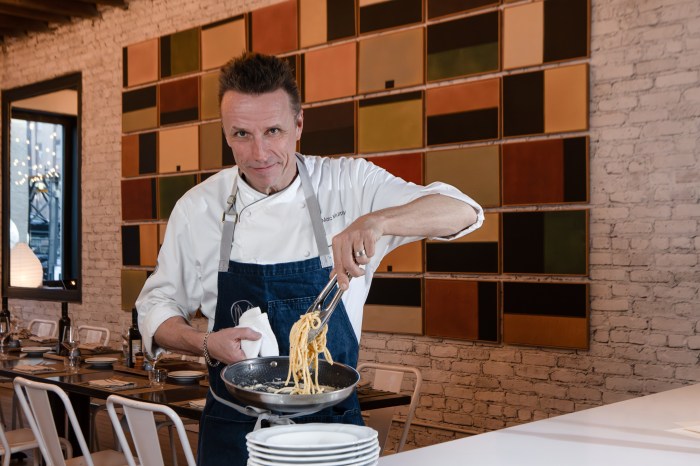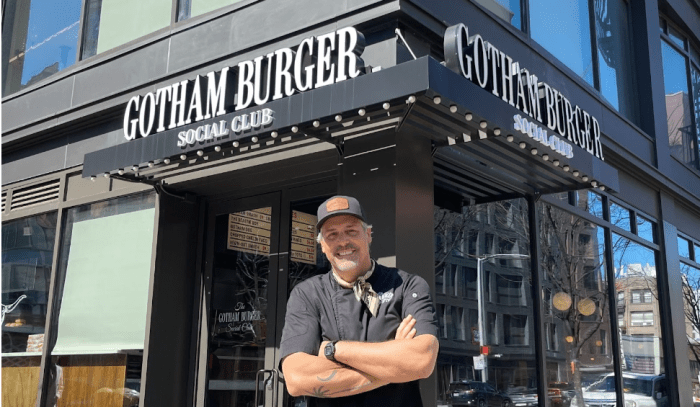African-American cooking is more than just soul food.
That’s the message JJ Johnson and Alexander Smalls want to get across in their new cookbook, “Between Harlem and Heaven” (out Feb. 6, $37.50, Flatiron Books).
“It’s so two-dimensional when you start to talk about African-American food, besides to throw it in a category of Southern food or soul food and keep going,” said restaurateur Smalls.
With “Between Harlem and Heaven,” the chefs want to continue a conversation they started when Smalls opened The Cecil, which focused on Afro-Asian-American cuisine, and next-door jazz club Minton’s in 2013, with Johnson helming the kitchens at both Harlem restaurants.
Upon opening, The Cecil made scores of best new restaurant lists, and Johnson got a James Beard Award nomination.
Since then, Johnson has left his post as executive chef, and The Cecil has been retooled as The Cecil Steakhouse. But its influence lives on in “Between Harlem and Heaven,” which pays homage to the food and cultural significance of the Afro-Asian diaspora.
As the name implies, it’s also an ode to Harlem, where both chefs also live. The likes of Nina Simone, Dizzy Gillespie, Thelonious Monk and Toni Morrison get shoutouts by the chefs, and there is an essay by cookbook co-writer Veronica Chambers on Minton’s Playhouse, a former jazz club in Harlem that is the site of Smalls’ Minton’s.
“This is a community where so much of our history has taken place and a lot of what has shaped the city, either it be jazz or the Great Migration of African-Americans from the South,” Smalls said. “All of that is an incredible foundation.”
For Johnson, Harlem is “the melting pot.”
“East Harlem was the place of Puerto Ricans, in Harlem there’s a little West Africa; you go back in time and there’s places that were Asian,” he said. “The flavor — you’re thinking of the music, you’re thinking of the spices, you’re thinking of the fashion.”
Through its essays and recipes, the cookbook is a history lesson on the African diaspora, Johnson said, and how cuisine has been shaped by this migration.
“You can turn the page and say, ‘Oh my god, I didn’t know I could make a tamarind barbecue sauce,’” he said. “We want to introduce people to what the real cuisine is. It’s more than just soul food.”
Added Smalls: “The goal was to really bring together the flavors of Africa in a global context.”
The recipes, which range from the West African-inspired cinnamon-scented fried guinea hen to an Afro-Asian-American gumbo to a collard green salad to oxtail dumplings, are inspired by both chefs’ travels through Africa and Asia, as well as their gastronomical explorations in NYC.
“Chinatown is always an inspiration — that’s what Ghana feels like, from a market standpoint and really big flavors,” Johnson said. “Flushing played a role; we would eat at Northern Chinese restaurants — Northern China and West Africa have a major connection through migration.”
In addition to introducing home cooks to a culinary style, Smalls hopes the cookbook is a source of pride for people of the African diaspora.
“It mirrors something about who they are in every dish,” he said. “It’s our pride, and it’s presented in a classic, elevated way that speaks to the value.”
Global gumbo
This gumbo features a world of influences: dried shrimp in the roux, in a nod to Senegal; the richness of the roux, in a nod to Louisiana; and the rice that the gumbo is served over, in a nod to South Carolina.
Afro-Asian-American gumbo
Makes 4 to 6 servings
4 tbsp. salted butter
1⁄4 cup vegetable oil
1⁄2 cup all-purpose flour
1 cup minced onion
4 cloves garlic, minced
1⁄4 cup minced celery
1⁄2 cup minced red bell pepper
1⁄2 cup grape tomatoes, halved
1⁄2 cup whole dried shrimp pepper
3⁄4 cup gumbo spice mix (see recipe)
1 tbsp. tomato paste
5 cups chicken stock
1 cup okra cut into rounds
2 tbsp. fresh lemon juice
2 tsp. Worcestershire sauce
1⁄2 cup Chinese chicken sausage
1⁄2 cup lump crabmeat
1 cup whole fresh Gulf shrimp
Kosher salt and freshly ground black pepper
4 cups cooked jasmine rice
In a heavy 4- to 5-quart pot, heat the butter and oil over medium heat. Once the butter begins to bubble slightly, add the flour and stir with a wooden spoon to form a smooth paste.
Cook the mixture for about 10 minutes to make a chocolate colored roux. While the roux cooks, make sure to stir continuously, scraping the bottom and sides of the pot to avoid burning. It is important to keep a very close eye on the roux during this step. The roux can go from a complex nutty color and aroma to burnt beyond repair in a matter of minutes.
After the roux turns from a smooth peanut butter color and consistency to one resembling rich chocolate, add the onion, garlic, celery, bell pepper, and tomatoes; this will stop the roux from overcooking and burning.
Lower the heat and cook the vegetables for 10 minutes. Add the dried shrimp, spice mix, and tomato paste and cook for 5 minutes.
Slowly whisk in the stock and stir until the stock is completely blended with the roux and vegetable mixture. Add the okra, lemon juice, Worcestershire sauce, sausage, crabmeat and shrimp and let simmer for about 1 hour over very low heat, stirring occasionally with the wooden spoon.
Season the gumbo to taste with salt and pepper and serve over the rice.
Gumbo spice mix
Makes about 2⁄3 cup
1 tbsp. dried oregano
1 tbsp. dried thyme
1 tsp. powdered bay leaf
1 1⁄2 tbsp. garlic powder
1 tbsp. onion powder
1⁄2 tsp. red chile flakes, or more to taste
1⁄2 tsp. ground cayenne, or more to taste
2 tbsp. sugar
2 tbsp. smoked paprika
1 tbsp. kosher salt
1⁄2 tsp. freshly ground black pepper
Stir together and store in an airtight container for up to 1 week.
Excerpted from “Between Harlem and Heaven” by JJ Johnson and Alexander Smalls. Copyright 2018 by JJ Johnson and Alexander Smalls. Reprinted with permission from Flatiron Books. All rights reserved.
IF YOU GO
JJ Johnson and Alexander Smalls celebrate the release of “Between Harlem and Heaven” at the 92nd Street Y on Feb. 7 at 7 p.m. | 1395 Lexington Ave., 212-415-5500, 92y.org | tickets $29











